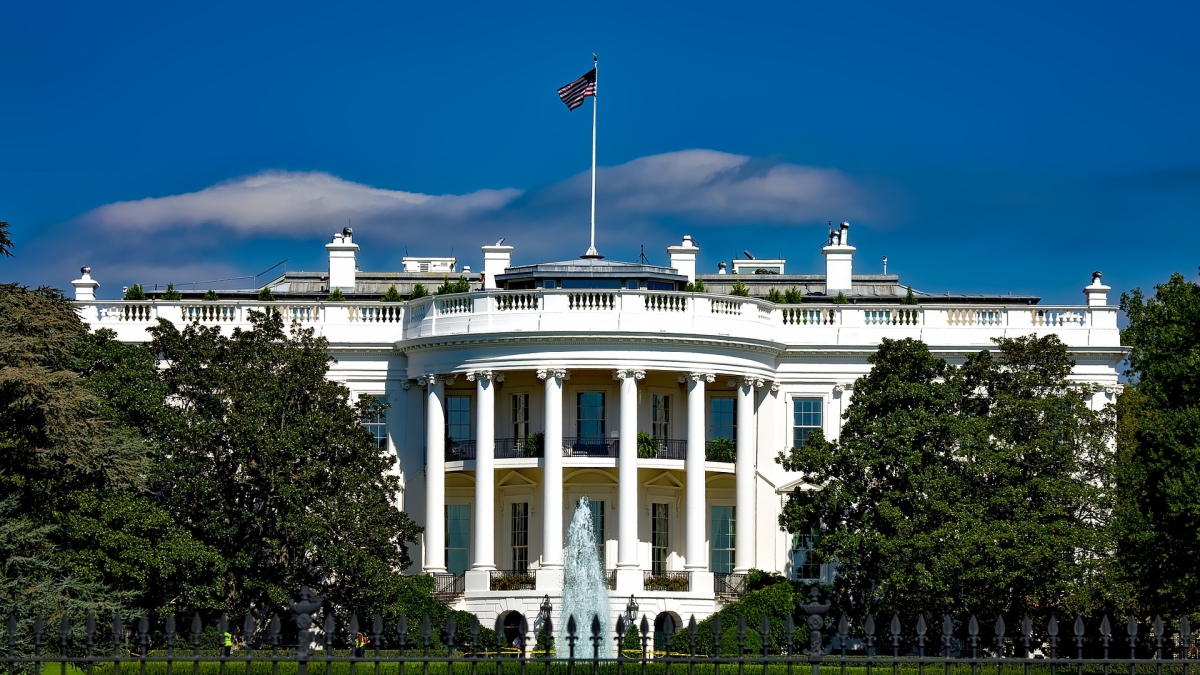President Donald Trump could be in hot water. Or his political opponents could end up eating another big nothing burger.
Either way, impeachment seems probable.
House Speaker Nancy Pelosi, D-Calif., announced Tuesday an impeachment inquiry into a whistle-blower’s report that Trump allegedly pressured Ukraine leader Volodymyr Zelensky to investigate Democratic front-runner Joe Biden and his son, Hunter, for political gain.
Even though Zelensky denied Wednesday — the same day Trump released a transcript of the conversation — that there was any pressure by Trump or a quid pro quo exchange in a July phone conversation between the two, articles of impeachment could still be forthcoming if Democrats believe there was a clear abuse of power.
All this comes just months after the Mueller Report, which also led to Trump impeachment talk.
Brooks D. Simpson, an Arizona State University Foundation Professor of history in the College of Integrative Sciences and Arts, is quite familiar with the process of impeachment. Simpson studies American political and military history as well as the American presidency, specializing in the era of the Civil War and Reconstruction.
ASU Now spoke to Brooks about the history, process and possible outcomes of presidential impeachment.
Brooks D. Simpson
Question: Historically, how many times have U.S. presidents been successfully impeached and who were some of the near misses?
Answer: Two presidents have been indicted by the House of Representatives on articles of impeachment. In 1868, Andrew Johnson escaped conviction in the United States Senate by a single vote; in 1999, Bill Clinton survived impeachment, although the outcome in the Senate was never in doubt. In 1974, Richard Nixon resigned just as the House of Representatives was preparing to vote on articles on impeachment after it became clear that Republicans in the Senate would vote to convict and remove him from office.
Q: Take us through the process of an impeachment. Where does it start and how does it evolve?
A: The impeachment process is twofold: The decision of the House of Representatives on whether to impeach, or indict, a civil official and the decision of the Senate whether to convict the impeached official. The House of Representatives initiates the process by investigating allegations of wrongdoing, including holding committee hearings. It may then decide to frame articles of impeachment upon which to base a vote to indict, although in 1868 the vote to impeach Andrew Johnson actually preceded the preparation of specific articles for the Senate to consider. Should a majority of the House support impeachment, the indicted official is tried in the Senate, with the Chief Justice (of the Supreme Court) presiding in cases where the president is on trial. The House appoints managers who present the case for conviction to the Senate, while the indicted official is represented by his own counsel; in 1868, Attorney General Henry Stanbery resigned his office to help defend Andrew Johnson. A two-thirds majority (67 votes today) of senators is required for conviction and removal from office.
Q: The framers of the Constitution established impeachment as a way to hold a president accountable for abuse of power. This seems like a vague statement, open to interpretation. What would be a good definition for abuse of power and does the current definition fit for what President Donald Trump has been accused of?
A: “Abuse of power” means the use of the powers of the presidency for ends that fall outside the United States Constitution. The illegal exercise of those powers constitutes malfeasance in office. The term often includes the concept of obstruction of justice, in which someone prevents, blocks or thwarts an investigation or a prosecution; it can also mean using one’s official powers for private gain.
Although there have been previous allegations of wrongdoing against President Trump, his associates, and members of his family, this most recent event involving negotiations with Ukraine asserts that he used the formal powers of the presidency as well as diplomatic and military leverage to seek the assistance of a foreign power to investigate the activities of former Vice President Joseph Biden and his son, Hunter, in connection with the operation of Ukrainian business interests and reports of corrupt activity in Ukraine. The president also stands accused of using the State Department and the attorney general as well as his private attorney, Rudy Giuliani, in pursuit of this objective.
The president’s critics note that such efforts seek to discredit a possible opponent in the 2020 presidential election; they remind us of previous allegations that the president and some of his associates have sought to work with foreign powers to influence a presidential election.
Q: How does the Constitution define the grounds for impeachment?
A: Article II, Section Four of the United States Constitution provided for the impeachment and removal from office of civil officials on the grounds of “Treason, Bribery, or other high Crimes and Misdemeanors.” Much has been made of what constitutes “high crimes and misdemeanors." One might compare this wording to a clause in the Articles of Confederation, which the Constitution superseded, that referred to “treason, felony, or other high misdemeanor.” Many observers overlooked this wording during the debate on whether Bill Clinton had committed an impeachable offense. As perjury is a felony, and Clinton had been charged with perjury, one could argue that he was indeed impeachable.
In Federalist 65, Alexander Hamilton, who had been one of the delegates to the Constitutional Convention in 1787, held that an impeachable offense should be defined broadly as “the misconduct of public men, or in other words from the abuse or violation of some public trust.” He observed that these offenses were “political” in nature; in short, the activity in question need not be criminal, not all criminal activity is necessarily impeachable, and it should be left to the courts to punish criminal activity. Thus, impeachment is first and foremost a political act: As future president of the United States and then House Minority Leader Gerald Ford famously opined in 1970, “An impeachable offense is whatever a majority of the House of Representatives considers it to be at a given moment in history.”
Q: The Democrat-controlled House could definitely bring articles of impeachment but then it would have to be tried and approved by the Republican-controlled Senate. Given that, how likely is impeachment? Is it a waste of time?
A: At this moment in time, the president’s impeachment by the House of Representatives is becoming more likely in light of these new allegations. However, for the moment enough Republicans in the Senate are standing by the head of their party to assure that he will not be convicted and removed from office. However, such was also the case for much of 1974. It was the collapse of Republican support for Richard Nixon in the face of evidence directly linking him to the Watergate cover-up that led the president to resign.
Different political considerations held sway in 1868. Andrew Johnson, who had been elected in 1864 as Abraham Lincoln’s vice president and who had become president in the wake of Lincoln’s assassination, had no vice president in the days before the ratification of the 25th Amendment. Several Republicans were concerned about what would happen in the wake of Johnson’s conviction and his replacement by the divisive Benjamin F. Wade, president pro tempore of the United States Senate. A Wade presidency might damage Republican chances to prevail in the 1868 presidential contest, despite what seemed like the inevitable nomination of war hero Ulysses S. Grant as the party’s standard bearer. Seven Republicans, uneasy about the articles of impeachment and worried about a Wade presidency, cast “not guilty” votes to acquit Johnson by a single vote.
Although at the moment Republican support of President Trump seems firm, it might erode in the face of new revelations. Nevertheless, a series of House committees reviewing the record of alleged presidential malfeasance as a presidential election approaches, especially through televised hearings, may bolster Democratic prospects in the 2020 presidential contest. Trump may become an albatross for Republicans running for other offices. How Biden’s candidacy will fare given the scrutiny into his involvement with Ukrainian affairs as part of the investigation into Trump’s actions remains to be seen, but it is unlikely that the former vice president will benefit from such attention.
Q: The Mueller investigation involved what seemed like a more serious accusation than this latest one. How much traction will this attempt get?
A: It may be easier for the public to grasp the nature of Trump’s wrongdoing concerning his conversation with Ukraine President Volodymyr Zelensky, especially as Democratic leaders freely characterize it using popular concepts of mobster activity, long a subject of American films and television. It is one thing to accept information tended by a foreign power, however questionable; it is another matter altogether to solicit foreign governments to assist in the discrediting of political rivals in order to secure reelection. The account of the president’s conversation offers a far clearer example of a “smoking gun” than the hard-to-follow tale woven by the Mueller Report, complete with reservations and qualifications complicating the narrative. Both allegations are serious.
Q: If this goes forward, how long do you think the process would take?
A: The pace at which House committees operate suggests that this will be a time-consuming process that will take months — absent a game-changing revelation. The Mueller Report, for example, lacked the clarity and the edge of Ken Starr’s 1998 report; in 1867 the House Judiciary Committee held hearings for months to gather evidence against Andrew Johnson without result. Johnson’s rash and defiant behavior in 1868 in defying congressional legislation and obstructing justice led to a trial that took less than three months after quick action by the House.
Q: Could this backfire on Democrats if impeachment does not go through?
A: The effort to impeach and try President Trump will damage Democrats if they fail to stay the course, act deliberately but forcefully, and render their case in easy-to-comprehend terms. Conviction, although most certainly welcome, is not necessary if the process enables Democrats to offer in stark and simple terms the case against Trump. Obviously new evidence exonerating Trump would mean political disaster for Democrats. However, Republicans also risk catastrophe if they discover that their support for the president means that they have boarded a sinking ship.
More Law, journalism and politics

How to watch an election
Every election night, adrenaline pumps through newsrooms across the country as journalists take the pulse of democracy. We gathered three veteran reporters — each of them faculty at the Walter…
Law experts, students gather to celebrate ASU Indian Legal Program
Although she's achieved much in Washington, D.C., Mikaela Bledsoe Downes’ education is bringing her closer to her intended destination — returning home to the Winnebago tribe in Nebraska with her…

ASU Law to honor Africa’s first elected female head of state with 2025 O’Connor Justice Prize
Nobel Peace Prize laureate Ellen Johnson Sirleaf, the first democratically elected female head of state in Africa, has been named the 10th recipient of the O’Connor Justice Prize.The award,…

